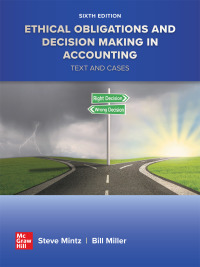Helen Roberts is reviewing two transactions recorded by her client, Biotechnologies (Biotech), as part of her accounting
Question:
Helen Roberts is reviewing two transactions recorded by her client, Biotechnologies (Biotech), as part of her accounting firm’s annual audit of the client for the December 31, 2021, financial statements. She knows Biotech is under pressure to maximize revenues for the year and reverse three years of losses. The reported revenue on its financial statements is $2.2 million. The amount of revenue from two transactions being reviewed is $1.0 million. Biotech lost $2.0 million during the last two years. If the revenue can be recorded at the $2.2 million level, Biotech would cover the losses for the past two years and be profitable for 2021.
Biotechnologies develops vaccines for infectious diseases like COVID-19. The company was formed following the outbreak of the virus. While it’s not working on a vaccine for COVID, the company hopes to develop therapeutics to fight similar infections in the future. Biotech went public in 2019 and its stock is listed on Nasdaq.
Helen Roberts is one of five partners in the firm of Morton & Best, LLC. Even though Biotech is its only public client, the firm is obligated to register with the PCAOB.
The fees earned from Biotech make up one-third of the firm’s total revenue from fees. As a result, it’s an important client for the firm.
Accounting Transactions
Sales to Distributor 1 on December 27, 2021
On December 27, 2021, Biotech sent Distributor 1 revised terms of a deal between Biotech and the Distributor. Under the revised terms, in order for the Distributor to receive a product they ordered and wanted, it would have to place an order for another product in inventory so that Biotech is able to record the $600,000 revenue on that product in 2021. Biotech expects the distributor to place the 600,000 order for this product that could be shipped by December 31, 2021.
The arrangement with Distributor 1 was developed because Biotech could not ship the specific product ordered by the Distributor by year-end as desired by the Distributor. That is why Biotech identified products in its inventory that it could ship by year-end so that it could record the revenue in 2021. Even though the Distributor didn’t order or want that product, it agreed to go through with the arrangement because Biotech’s agreement included a provision that the Distributor could return the unwanted product in the first quarter of 2022 and replace it with the product desired. The purchase order was changed to reflect the new arrangement.
Sales to Distributor 2 on December 30, 2021
An order for the purchase of $400,000 product of Biotech on December 1, 2021 by Distributor 2 contained the terms of payment as net 30 days or due by December 31, 2021. The product was to be shipped on December 20, 2021. Distributor 2 informed Biotech that because it was a start-up company, it wouldn’t be able to pay by that date and maybe for at least 60 days thereafter. Biotech then came up with an arrangement whereby Distributor 2 could return the product anytime during the 60-day period, with no questions asked, and be credited for its account payable. Distributor 2 agreed to buy the product based on these terms and Biotech recorded the $400,000 as revenue on December 20, 2021, the shipping date.
Biotech’s Arguments for Recording the Revenue in Fiscal-Year End December 31, 2021
The CFO of Biotech explained why revenue should be recorded on the sale of product to both distributors as follows. Revenue from the product shipped to Distributor 1 by year-end could be recognized on the shipping date. The fact that the Distributor could return it next year was nothing new. The sale of any product to a customer could be returned after purchase.
The product shipped to Distributor 2 occurred on December 20, 2021, before year-end, so revenue could be recorded on that date. The sale of any product to a customer could be returned after purchase. The fact that the return would be credited with no questions asked was standard company policy.
Helen Roberts is preparing to meet with the CFO of Biotech to discuss these transactions and the way revenue has been recognized. Answer the following questions to help her prepare for the meeting.
Questions
1. Analyze the transactions with both distributors with respect to revenue recognition and how the CFO explained the position of Biotech. Was revenue recognized properly under GAAP? Why or why not?
2. How would you characterize the motivation of Biotech for the way it recorded the transactions? What was the effect on the way earnings were recorded?
3. How would you explain Biotech’s responsibilities under SOX? Be specific.
4. Assume Roberts is attempting to determine the firm’s possible liability for recklessness or fraud depending on whether it accepts the client’s explanations. How might she go about the analysis?
Step by Step Answer:

Ethical Obligations And Decision Making In Accounting Text And Cases
ISBN: 9781264135943
6th Edition
Authors: Steven Mintz





